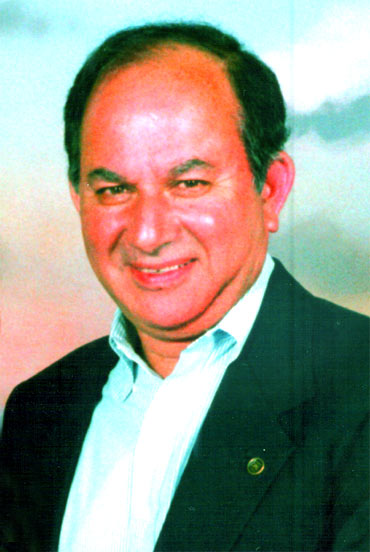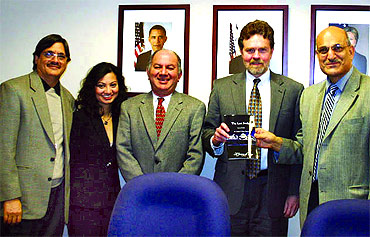
Aziz Haniffa meets Maharaj Kaul, a man fighting for the cause of Kashmiri Pandits -- those who were displaced and those who are stuck in Jammu
In the United States, to get an authentic and authoritative take on the history, culture, and contribution of Kashmiri Pandits, you have to go to Suffern, in Rockland County, a northern suburb of New York City. For that is where Maharaj Kaul lives.
For over two decades now, Kaul has been the go-to guy for Kashmiri Pandits in the US, particularly for organisations like the Indian American Kashmir Forum or the Kashmir Overseas Association or the International Kashmir Federation lobby on Capitol Hill.
A retired engineer, Kaul is the quintessential renaissance man -- historian, author, poet, philosopher -- who, just in the past few years has published over five books, 122 poems and tons of articles.
Over the years, he has passionately pursued his interest in the origin of art, science and culture and how they have changed with time. Last year, he published two books: Inclinations And Reality: The Search For the Absolute, and a book of poems, The Light Through The Woods.
 |
His deep and exhaustive knowledge of Kashmiri Pandit history, traditions and culture has made him an invaluable and indispensable resource for the community's activists in the US who have sought to alleviate the lot of the Pandits, the majority of whom are now refugees across India after losing their homes and other property to terrorists and most of their culture, an integral part of the Kashmiri culture, gone.
Thus, when activists have met the likes of US Representative Frank Pallone, New Jersey Democrat and founder and co-chair of the Congressional Caucus on India and Indian Americans, and US Senator Sherrod Brown, Ohio Democrat -- two of the strongest supporters of the Pandit cause -- Kaul has invariably been there.
Many of the letters to colleagues, resolutions and letters to the administration from the likes of Pallone and Brown -- calling on Washington to prevail on New Delhi to address the Pandits' plight and explaining how much a part of Kashmir's history and culture they have been -- have been drawn from the briefings and informational material provided by Kaul.
Over a decade ago, following Brown's intervention, the State Department on its annual compendium of the status of human rights worldwide began including the violations of human and civil rights of the Kashmiri Pandits that had been hitherto ignored, largely on information and material provided by the Kashmiri Pandits in the US. Again, thanks to Kaul's vast reservoir of research and knowledge.
Last year, on the strength of material provided by the likes of Kaul and other Kashmiri Pandit activists, Brown wrote to Secretary of State Hillary Clinton to take up the plight of the Pandits and their future with the Indian government.

In 2002, a KOA publication, Destruction and Injustice: The Tribulations of the Kashmiri Pandits, was distributed on Capitol Hill and then to senior officials of the administration and think-tanks.
It, Sanjay Kaul said, was developed under Maharaj Kaul's "able guidance and he edited this publication and this was what really helped these lawmakers and other non-Kashmiri Indians as well as other foreigners to understand the intricacies of the Kashmir problem."
Jeevan Zutshi, a California-based Kashmiri Pandit activist, said, "There is nowhere I go or any senior official, either in Congress or the administration I meet, without Maharaj."
 |
Zutshi, president, International Kashmir Federation, regularly hosts US lawmakers at his home and organises seminars and conferences on Capitol Hill in conjunction with groups like the Hindu American Foundation to bring to the fore the Pandit's plight.
"I love him for his beliefs, his love for humanity irrespective of their religious beliefs and his desire to see Kashmiris live peacefully together like they did once," Zutshi added.
Professor Subhash Kak, Regents Professor and head of the department of computer science, Oklahoma State University in Stillwater, said, "Maharaj Kaul is a man of diverse interests that range from current affairs to philosophy to poetry. He has made invaluable contributions to the Kashmiri Pandit Diaspora in the United States in a leadership role."
Maharaja Kaul said the writing bug hit him around age 9, "when after finishing writing a letter to a relative, I realised that I had an ability to write. Though I didn't give it much importance then, others kept reminding me that I had this talent. At age 12, I wrote a three-page short story, A Night To Remember. My father who read it thought that it was well written but lacked substance. I was a little hurt by that evaluation but the writing fantasy remained. 1n 1952 a significant event happened in my life, when my father decided to leave me with my uncle in Srinagar, while he and the rest of the family were living in New Delhi This separation from my family, at that point in my life, was very traumatic to me. It was the first heartbreak of my life. My writing bears the shadows of that sorrow."
After joining college, he "realised I was inclined to be a man of letters, particularly of English literature. But my realism felt going that way would entail a life of poverty and humiliation for me. The reason for that feeling was that Srinagar had only two colleges at that time and if I could not secure a teaching position in them I would end up being a clerk with the government. It was a realisation that put me on the painful course away from the pursuit of a career in literature. This was the second heartbreak of my life. I was introspective by nature. I wanted to understand the reason behind everything, which plunged me into almost continuous thinking. Sometimes, it took me great efforts to break myself from this intense state of thinking. So, from literature I went into philosophy, and from there to science, culminating into religion."

In his literary autobiography Inclinations And reality: The Search For The Absolute, Kaul traces the influence of the experiences, culture, science, religion, and politics on his mind since childhood, and now at the vantage point in the evening of his life, looks back to see what has created his universe and why.
He looks back to his lonely childhood and boyhood in the ethereal beauty of his birthplace, the intricacies of family relationships, the complex web of the Hindu-Muslim divide that evolved over 700 years and cast a strong shadow on the current situation in Kashmir, with the dark power of religion's grip in the psyche of the majority population.
Kaul paints the drama of the Pandits' life in Kashmir in the 1950s, their frustrations and hopes, and traces it to its historical and psychological roots. He then carried these inquiries to Banares, one of the most religious places in the world, and then to America, trying to understand a culture very different from the one in India.
He explores the nature of Kashmiri Shaivism, Hinduism, and Buddhism and concludes with a searing analysis of religion and juxtaposes it with science, in his personal and penetrating journey for the meaning of human life.
What is the future of the Kashmiri Pandits?
 |
"When a man is robbed of his belongings, kicked out of his home, and forced to leave his land where his ancestors had lived for thousands of years, it is very hard to imagine that he will continue to have faith in the human values of his tormentors and destroyers --even of his neighbours and countrymen at large, and even that of the people around the world," he said.
"Kashmiri Pandits, the original inhabitants of Kashmir, have been kicked and destroyed before, but never have they been so grossly brutalised, victimised, and dehumanised as this time. The annihilation of Pandits happened while the government of India was watching and well aware of the dimensions of the tragedy taking place but chose to play soft with its perpetrators, Muslims, in the hope of winning the civil war in Kashmir one day," he said.
Today, he continued, "Most of the Pandits pass time in the dreary, pigeonholed, futureless existence in Jammu. Thousands of men in mid-30s to mid-50s never go to work, as they have chosen to survive on government handouts given in lieu of the salary they would have earned if they had the proper conditions to work in Kashmir. This psychological-self-annihilation is the worst price the Pandit community is paying at the hands of the civil war. It will take generations before Kashmiri Pandits of Jammu and Kashmir will regain purposefulness, confidence, and cheerfulness in their lives. Although Kashmir will continue to remain under India, its past social and cultural atmosphere will never reemerge. Kashmiri Pandits have to accept the fait accompli of the situation the events have thrown them into. They are the sideshow of the sideshow in this insane and ancient drama played between Muslims and Hindus. Kashmir cannot become their home in the same way as it was before."
He added, "How can a Kashmiri Pandit return to a place where his fellow Kashmiri Pandits have been murdered, many of their houses have been burnt, by a majority community who hates them? Even though Kashmir will continue to remain a part of India, it is no longer a home of the Kashmiri Pandits. It would make a lot of sense for Kashmiri Pandit organisations like Panun Kashmir to withdraw from the cause of returning Pandits to Kashmir and re-channel their energies and financial resources to the placement of young Kashmiri Pandits in jobs, helping in the education of the destitute children, and the creation of international networking for the sustenance of the Pandit identity and ambition."
He argued, "No energy should be expended to influence the government of India because it has its own strategy and agenda."